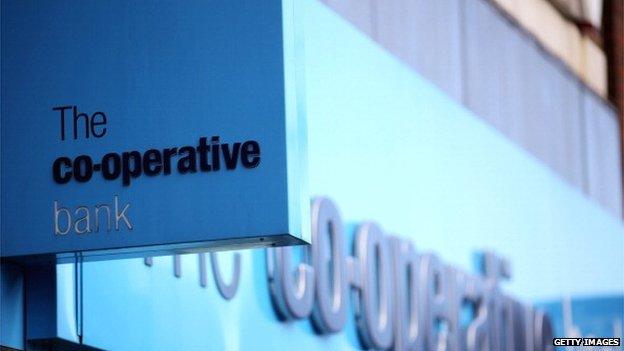The Co-op Bank - when is a punishment not a punishment?
- Published
- comments

Eyebrows might well be raised this morning after the Bank of England's Prudential Regulation Authority (PRA) and the Financial Conduct Authority (FCA) threw the kitchen sink at the Co-op Bank for multiple failings but said, all things considered, it wouldn't be fining the organisation.
The language used by the PRA and the FCA about the chaos at the Co-op Bank which almost forced a state-funded bailout could not be clearer.
Andrew Bailey, the head of the PRA, said that the "failings stand out both for the duration and seriousness of the risk management and control deficiencies uncovered.
"This was compounded by a lack of openness with their regulator," he continued. "These were serious transgressions."
As a reminder about the mess the Co-op got itself into between 2009 and 2013 it is worth reading the findings of Sir Christopher Kelly's report of last year.
But, no fine, even though the PRA admitted that it could have levied a £120m penalty.
What - could well be the question following today's surprising announcement - would a bank have to do wrong if even in this instance a "public censure" is not backed up by a financial punishment?
My sources at the FCA have admitted that this is the first time a firm of the Co-op's size has escaped a fine given the findings against it.
The main reason, according to both the Bank of England and the FCA, is that the Co-op still has a lot of work to do building its capital position, the key marker of the financial health of a bank.
Remember, the Co-op was the only bank to fail the Bank of England's stress tests last year.
The regulators appear to have made the judgement that because the bank is still making losses, a fine would have been counter-productive.
And that the new management team led by Niall Booker have put a turnaround plan in place. Investigations in to individuals linked to the Co-op debacle are also on-going.
Further, it has been pointed out to me that the PRA's key objective is "to promote the safety and soundness of the firms it regulates".
And for the FCA it appears that the process of "repair" at the Co-op could have been put back if a fine had been levied. The Co-op Bank is still making significant losses.
Which is an argument, some might say, that could have been made about Payment Protection Insurance (PPI) mis-selling where the Royal Bank of Scotland and Lloyds were fined billions of pounds despite facing considerable financial headwinds. Rightly, most would say.
The PRA and the FCA insist this is different and that the Co-op Bank was an "extraordinary" event.
In the financial crisis, we certainly saw plenty of them.
Certainly the lack of a fine appears pretty unique.